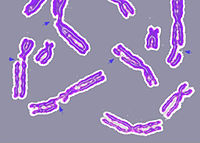
Photo from wikipedia
Failure of effective DNA damage repair is a hallmark of cancer, but was previously underappreciated as a driver of aggressive prostate cancer. However, recent international sequencing efforts have revealed that… Click to show full abstract
Failure of effective DNA damage repair is a hallmark of cancer, but was previously underappreciated as a driver of aggressive prostate cancer. However, recent international sequencing efforts have revealed that both germline and somatic alterations within the homologous recombination and mismatch repair pathways are relatively common in lethal metastatic disease. BRCA2 gene alterations are particularly prevalent and are linked to poor prognosis as well as poor responses to systemic therapy for castration‐resistant prostate cancer, although there is conflicting support for the latter. Defective DNA repair contributes to tumour heterogeneity, evolution and progression, but there are high hopes that management of this aggressive subset will be transformed by biomarker‐driven use of poly‐ADP ribose polymerase (PARP) inhibitors and platinum‐based chemotherapy. In this review, we detail the relationship between DNA repair defects and prostate cancer, highlighting the prevalence of mutations in key genes and their controversial association with clinical outcomes.
Journal Title: BJU International
Year Published: 2019
Link to full text (if available)
Share on Social Media: Sign Up to like & get
recommendations!